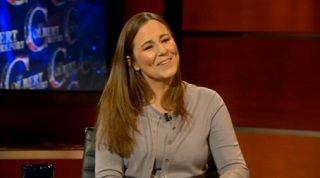Doing What Comes Naturally

She ended her talk by saying: Of course we all need to do the very basic things as sensitive people living on a planet that is so quickly destroying itself environmentally. We need to buy organic food and support local farmers, reduce our consumption of as many resources as possible, drive eco-friendly cars (when we can’t walk or bike), re-use old things, and do all the other things that you and I take for granted. She went on to encourage us to go beyond these obvious modes of living and to do more: to organize pro-environmental groups, protest against stupidity and corruption in government, and so forth.
As she spoke, I thought about the task in front of us, which could be summarized as simply as this: making a respect for sustainable living completely universal in humankind. We need to get to the point where all this is second-nature to everyone living on Earth.
We don’t need to be told to drink water when we’re thirsty. I’m going to go out on a limb and guess that neither of the people pictured here needed any special instructions, or to learn new motivations that were previously foreign to them.
Somehow, we need to get to the point where all of civilization sees its love for the environment as an integral part of living as a human being on a small and fragile, but intensely beautiful planet.


This is serious stuff so what’s the point of the romance scene?
I thought it would be clear: people don’t need to change their viewpoints of life to enjoy kissing; it comes naturally. I’m hoping the same will eventually be true of people’s regard for the environment.
Keep up the good work Craig, hoping is all it takes to make the world a better place to live in for both ourselves and future generations. We don’t really need to become proactive and to make changes. Right? (sarcasm)
We all do what we can.
Excellent points – the only caveat I’d note is that the planet is not destroying itself environmentally; instead, we are collectively causing severe and accelerating damage to our own biosphere’s ability to support and sustain us.
We all need to live as sustainably as we can, and think carefully about how best to do that.
However, we also need to organize as a species to change our infrastructure and to firmly channel the way we do business so that all the costs and benefits are entered into the equation with the long-view in mind. This requires a careful mix of good information, intellect and integrity, and a rare combination of boldness and prudence.
I regard your many contributions to that effort as significant and respectable.
Good points and thanks for the kind words.
Ah ha, it’s good to know old hippies never die,…they just turn green and appear on the lecture circuit 🙂
The ”consume less”, ”back to nature”, reductionist philosophy, is usually accompanied by a covert loathing of mankind, disingenuously presented as a love for mankind.
At a recent conference about the future of the coal industry, I was intrigued to find myself sharing a luncheon table with a young, highly educated, and ever so earnest environmental lawyer. Not only did he possess a law degree, but qualifications in various disciplines.a PhD.
He launched int a passionate condemnation of the coal industry, ignoring the discomfiture of other diners, who wanted a respite from the speakers. In an effort to lighten proceedings, and observing another diner taking a tablet, I remarked that coal had brought some benefits to mankind, after all, without coal, there would be no coal tar.
Instead of being amused, the young man launched into a lecture on the toxicity of coal tar.
Although very well intentioned, he lacked the sense of humor necessary to be a successful lawyer. . As the other diners joined me at the bar, his boss apologized for his young employees behavior, explaining that the young man’s grandfather had been a school teacher in a poor mining village, and sadly, died of black lung disease (pneumoconiosis ).
The point of this story, is that IMHO, all human endevour has upsides and downsides. Without the production of coal tar, not only wouldn’t the modern ‘black top’ road exist, but neither would a wide range of medicines, including paracetamol .
Modern economies are based on promoting the widest variety of consumer goods imaginable. Our modern Western democracies, are based on the principle of choice. The, freedom to create and offer for sale, any product of human imagination.
Freedom of choice, is what guarantees political freedom. Annie Leonard is perfectly free to pursue her lifestyle choices. She believes she is morally justified to sneer at the millions of enterprising, diligent inventors, purveyors, and consumers of all the “stuff” that makes modern economies, so creative, diverse, complex,…and well just plain “human”.
All civilized economies are built on the principle of increasing surplus.
Since the beginning of the industrial revolution, there have always been the “Armageddon” peddlers. Advocates preaching (always with a privileged background), that humans are selfish, immoral, and doomed to destroy the world.
The list of the sages of doom, and their tirade of prophesies, none of which has ever occurred, is endless.
Otherwise it’s just a fantasy. The danger of fantasies, is they get mistaken for fact.
Annie Leonard’s vision of society, if tried to be put into practice, would not be a utopian paradise, but more likely resemble the bleakness of an old Warsaw pact country.
Annie Leonard and her fellow travelers, would be pretty harmless, except they detract attention from real environmental action. It’s only possible to sing Kumbaya in Oregen, because the rest of the nation deals with real economic problems affecting of a complex modern industrial society.